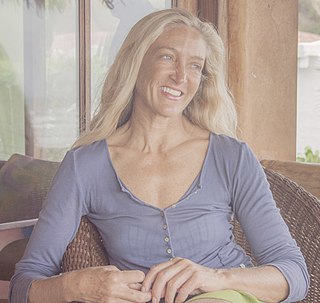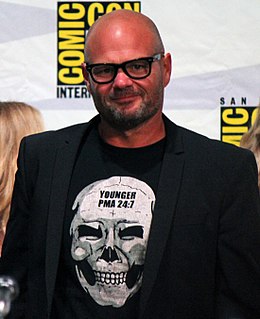A Quote by Jim Woodring
In a long story like 'Weathercraft,' it becomes kind of convoluted. It can become perhaps difficult to remember what led up to whatever point you're at. I worried a little bit about people being able to keep the shape of the story in their heads while they were reading it, and not wonder how they got wherever they were.
Related Quotes
I look to everyday magic in art to remember how to live: how to estrange and vivify ordinary objects and beings. So little, really, is ordinary, but to remember this I need the brain chemical of painting and film and reading I had a thrummy doomed oracular feeling when I wrote blackened baby teeth into my little blind boy story: I saw teeth and in an instant they were becoming something else. They were buckshot. They were food. They were tiny flightless corvids.
I had no intention of replacing Arnold [Schwarzenegger]. There were a few things that made me want to do the movie. They were the script which had a different direction to it, and it was a chance to do a very different Quaid. I didn't read the short story until I went to college.Reading the story had a different effect on me of how I pictured him to be and the tone of the story was different. In the story, he's a bit more of an everyman.
We all are born with a certain package. We are who we are: where we were born, who we were born as, how we were raised. We're kind of stuck inside that person, and the purpose of civilization and growth is to be able to reach out and empathize a little bit with other people. And for me, the movies are like a machine that generates empathy. It lets you understand a little bit more about different hopes, aspirations, dreams and fears. It helps us to identify with the people who are sharing this journey with us.
Most people tell themselves these excuses - I've always been this way, this is my nature, I can't help it - that are just memes. They're belief systems that keep you from being able to become all that you are intended to become. They're impediments to reaching God-realization, or Tao-centeredness. People lose track of their purpose, because they are so back there - living in their past. Byron Katie speaks about this: Who would you be without your story? Carlos Castaneda used to say if you don't have a story, you don't have to live up to it. So get rid of your story.
Keep a diary, but don't just list all the things you did during the day. Pick one incident and write it up as a brief vignette. Give it color, include quotes and dialogue, shape it like a story with a beginning, middle and end—as if it were a short story or an episode in a novel. It's great practice. Do this while figuring out what you want to write a book about. The book may even emerge from within this running diary.
When I was around 12 or so, I saw 'The Shining.' I just remember that being a turning point for me, where I started to think about the fact that there was a hand behind the film. That it wasn't just this magical story being told - there were actual people crafting these films, and they were works of art.
What I feel the most confident about as a teacher, whatever my strengths and weaknesses are. The fact that I got to be around those people, I feel like that I have something to offer because of that blessing. Being around them a little bit... I'm not them. I'm certainly not trying to compare myself to them. But in lieu of them being able to impart something, the fact that I had so many people like that that were kind to me and talked to me was invaluable.
There was a Yale even before Larry [Kramer] and I got there, and there were three designations of students: "white shoe," "brown shoe," and "black shoe." "White shoe" people were kind of the ur-preppies from high-class backgrounds. "Brown shoe" people were kind of the high school student-council presidents who were snatched up and brushed up a little bit to be sent out into the world. "Black shoe" people were beyond the pale. They were chemistry majors and things like that.








































